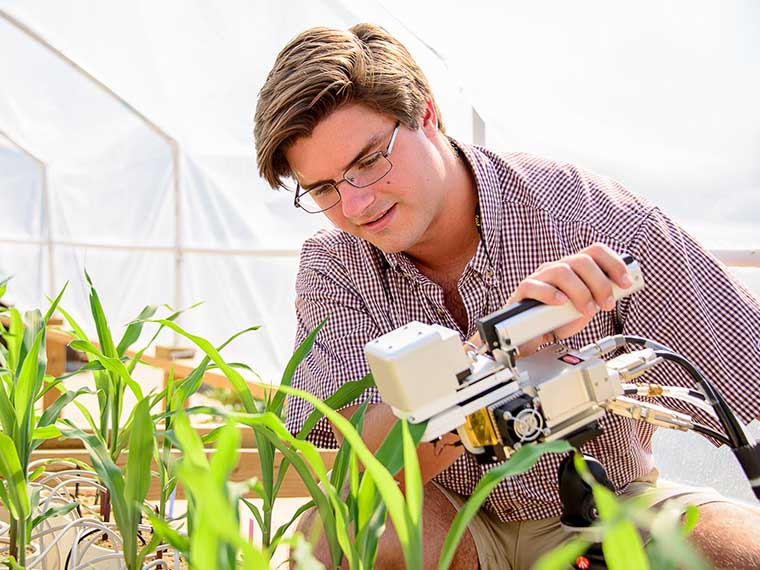The information presented on this page may be dated. It may refer to situations which have changed or people who are no longer affiliated with the university. It is archived as part of Mississippi State University's history.
Agricultural companies have promoted corn hybrids with drought-resistant genes for the last few years. However, little research has been conducted to determine how well these hybrids perform under drought conditions.
Senior agronomy major Hunt Walne is testing the drought tolerance of six different corn hybrids, half of which have drought-resistant genes.
Walne is an undergraduate research scholar working under the direction of Dr. Raja Reddy in the Environmental Plant Physiology Laboratory. His experiment includes corn hybrids from three different companies and he is examining three different irrigation strategies.
In the spring of 2016, Walne examined how fast these hybrids germinated in an incubator. This fall, he is measuring early plant growth.
The experiment includes 96 plants with five replications of the six hybrids in three irrigation treatments: full irrigation (100 percent), 66 percent, and 30 percent.
The best part of the research, according to the Collierville, Tenn. native, is how it brings his classroom experiences to life.
"I remember learning the scientific method in high school but when you conduct research, the scientific method takes on new meaning," Walne said.
The undergraduate research scholar program piqued Walne's interest in research and graduate school. He credits his research mentor, Reddy, an internationally-recognized agronomist, for fostering that interest.
"Dr. Reddy emphasizes meaningful research that will make an impact," Walne said. "His hands-on approach to teach you how to conduct research is something I will take with me for the rest of my life."
Walne is measuring the soil moisture daily and measures plant growth and development, including number of leaves and plant height at regular intervals. At the end of the experiment, 21 days of growth, he will measure photosynthesis, leaf area, and the dry weight of the leaves, stems, and roots of plants. He will then measure numerous root traits such as root volume, number of roots, roots tips, and root surface area using imaging software.
He hopes to determine if hybrids with drought genes exhibit good early growth performance in various stages of drought.
Reddy stresses the value of the research, as it relates to abiotic stresses brought on by climate change.
"This research will demonstrate how effective drought-tolerant genes are in corn hybrids under varying drought pressures," Reddy said. "The research looks at early-stage growth but can easily be expanded to look at mid-stage growth and, ultimately, yields in drought-prone environments."

